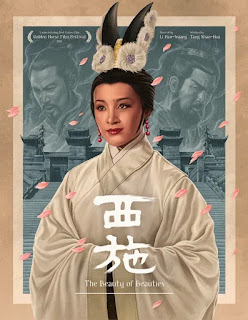Hsi Shih: Beauty of Beauties
Historical period pieces take advantage of everything cinema has to offer: thousands of extras, elaborate costumes, detailed sets and a carefully orchestrated visual palette all in an effort to convince the audience that what they’re seeing is real…when, of course, all that artistry means it’s anything but. Based on the legend of one of China’s “Four Great Beauties,” Hsi Shih: Beauty of Beauties (1965) is an ambitious response to western epics like Cleopatra (released just two years earlier), sending its heroine into the lion’s den to seduce and undermine King Fucha and destroy the barbarous Wu Kingdom from within.
Part of a delegation of women sent to appease Fucha’s insatiable appetites, Hsi Shih has actually been trained to whisper into the ears of the enemy and foment a feud with the senior advisor. Quick on her feet and easy on the eyes, His Shih does her job so well that even fellow countrymen begin to question her loyalty. But when the time comes for action, she’s the central cog in a wheel of military plots and machinations, resulting in a massive battle for rulership of the China itself.
Director Li Han-hsiang was a Shaw Brothers veteran who took his talents to Taiwan in hopes of securing more creative freedom and bigger budgets. He got both on Beauty of Beauties, staging immense battles and crowd scenes that provide a massive sense of scale, along with gorgeous interior sets that seem to go on forever. The story itself unfolds like a pop-up history book, highlighting certain scenes with meticulous care and rushing through others. The film is at its best when it narrows the focus onto Hsi Shih herself, dodging suspicion and manipulating minds like a middle kingdom Mata Hari. The side stories of political maneuvering and patriarchal posturing don’t resonate quite as well, ending with an uncomfortably accurate bit of pro-China propaganda.
While that may be why titles like this don’t get released often in North America (we tend to get martial arts and comedies almost exclusively), this is a great opportunity to discover just how much more Asian cinema is out there. Don’t be intimidated by the history; this is something any cinephile will appreciate. The 88 Films Blu-ray is a brand new 4K remaster from the original negative and looks just wonderful. Extras include an interview with Tony Rayns, trailer, restoration comparison and liner notes.




Comments
Post a Comment